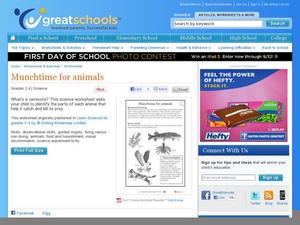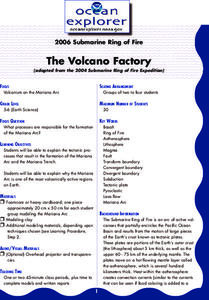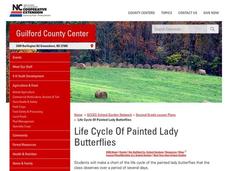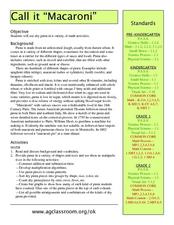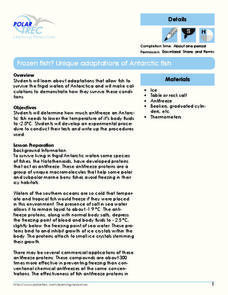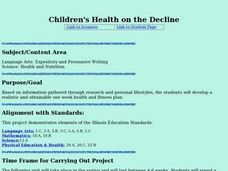Curated OER
Sustainability and the Recycling of Words
Recycling and green living isn't just for the environment anymore. Studying the use of metaphors and metonymies, especially in reference to environmental sustainability, this presentation provides viewers with plenty of food for thought....
Global Change
Impact of a Changing Climate on the Pacific Walrus
How many of us can say they've seen a Pacific walrus? Not many and one of the reasons is the impact of climate change on their aquatic environment. Children get to think about the food web of the Bering Sea by creating an actual web with...
American Chemical Society
Molecules in Motion
I heard that oxygen and magnesium were going out and I was like "O Mg." Pupils experiment with adding food coloring to water of various temperatures in order to determine how temperature impacts molecular movement. This is the...
Ocean Explorer
Architects of the Coral Reef
Coral Reefs are the focus of a life science lesson plan. Upper graders look at how coral reefs are formed, how the animals and plants reproduce, and the variety of ways that humans benefit from coral reefs around the world. Groups of...
Curated OER
Munchtime for animals
Which animals eat meat to stay alive? Third graders group fish, hawks, and cats into carnivores and herbivores. An extended activity prompts kids to cut out magazine pictures of different animals according to the foods that they eat.
Chicago Botanic Garden
Are All Plants Created Equal?
Photosynthesis requires energy and produces food, and cellular respiration produces energy and requires food. An interesting lesson analyzes the factors that affect the rates of photosynthesis and respiration. Classes spend one day...
National Nanotechnology Infrastructure Network
Creating and Testing Silver-Nanoparticle Socks
Antibacterial socks are a product of nanotechnology. An inquiry-based lesson asks collaborative groups to create their own antibacterial socks and then test them against other products on the market. The sock with the least amount of...
Ocean Explorer
The Volcano Factory
The tectonic processes that have resulted in the formation of the Marianas Arc, and the Marianas Trench are explored. Groups of pupils access websites that give them a wealth of information about these formations. Each group must prepare...
NC Cooperative Extension, Guilford County Center
Life Cycle Of Painted Lady Butterflies
The Very Hungry Caterpillar is the inspiration for this project-based learning activity. Kindergartners create a lifecycle chart for a butterfly with four sections: egg, caterpillar, pupa, and butterfly. It is a three-dimensional...
Curated OER
What Do Koalas Need to Survive?
First graders take a field trip and examine the Koala and his habitat. In this Koala lesson, 1st graders read Possum Magic and discuss the foods of Australia. Students view the habitat of a Koala and record what it eats, its physical...
Curated OER
Respiration
This series opens with diagrams of experimental setups. A data table is displayed and questions are asked, indicating that the intent is for lab groups to perform the depicted experiments. At slide twelve, a coherent lesson about the...
Curated OER
Classifying Deep-Sea Organisms
Young scientists access the EARTH Web site in order to engage in this lesson life forms found in the ocean. Student groups of 3 - 4 choose one set of deep-sea organism images. The groups decide how they would classify their organisms and...
Curated OER
Take a Stab!
Your geology class practices taking core samples of a potato to examine the stratigraphy. This is a terrific modeling lesson that helps youngsters visualize strata that cannot be seen from the surface of the ground. The directions...
Curated OER
Exploring Density with Salt and Fresh Water: Part 5
This particular lesson was written by the National Earth Science Teachers Association, but density is a concept that you can teach at the beginning of the school year in your life, physical, or earth science classes. It would be fun to...
Baylor College
The Variety and Roles of Microbes
Mini microbiologists play a card game in which they group microorganisms by groups: virus, fungus, protist, or bacteria. Then they identify the roles different microbes play in the natural world and explore how humans effectively use...
University of Kentucky
Beneficial Bug Scavenger Hunt
Many people think of bugs as annoying pests to be squashed, but most insects and spiders are beneficial, eating the actual pests or pollinating plants. After reviewing some of the common bugs in your area (they may differ from those...
Curated OER
Insects A-Z!
Alphabet insects! Who has ever heard of such a thing? Get ready because your class is going to research insects that start with a specific letter of the alphabet. In small groups, they'll use the Internet and reference texts to locate...
Curated OER
Design a Reef!
Using a miniature coral reef aquarium kit, young ecologists model this unique ecosystem. They research various coral reef organisms and their niches, and they culminate the project by working together to write a report. Use this activity...
Curated OER
Penguins Around the World
Students investigate penguins. In this Science instructional activity, students compare and contrast penguins to flying birds. Students use a Venn diagram to illustrate the differences and similarities of penguins and flying birds.
Curated OER
Call it "Macaroni"
Who knew there were so many fun educational opportunities featuring pasta? Scholars read a brief informational text about the history of pasta (note that "macaroni" is spelled two different ways, so address this if kids are reading...
Polar Trec
Calorimetry Lab
Young people between the ages of 11–13 need on average about 2,000 calories per day. Within the lab, groups learn about calorimetry and respiration. They explore how it pertains to humans and animals living the Arctic where cold...
Polar Trec
Frozen Fish? Unique Adaptations of Antarctic Fish
Some fish contain proteins that act like antifreeze in order for them to live in the frigid waters of Antarctica! High schoolers determine how much antifreeze a fish needs to lower its body temp to -2.5 degrees. Teachers act as a...
Chicago Botanic Garden
Climate Change Impacts on Ecosystem Services
The fourth activity in a series of five has classes participate in a jigsaw to learn about global impacts of climate change and then share their new information with a home group. Groups then research impacts of climate change (droughts,...
Curated OER
Children's Health on the Decline
Demonstrate the importance of children's health with this cross-curricular lesson, which includes elements from health and science as well as expository writing. Middle schoolers develop realistic and obtainable one week health and...






